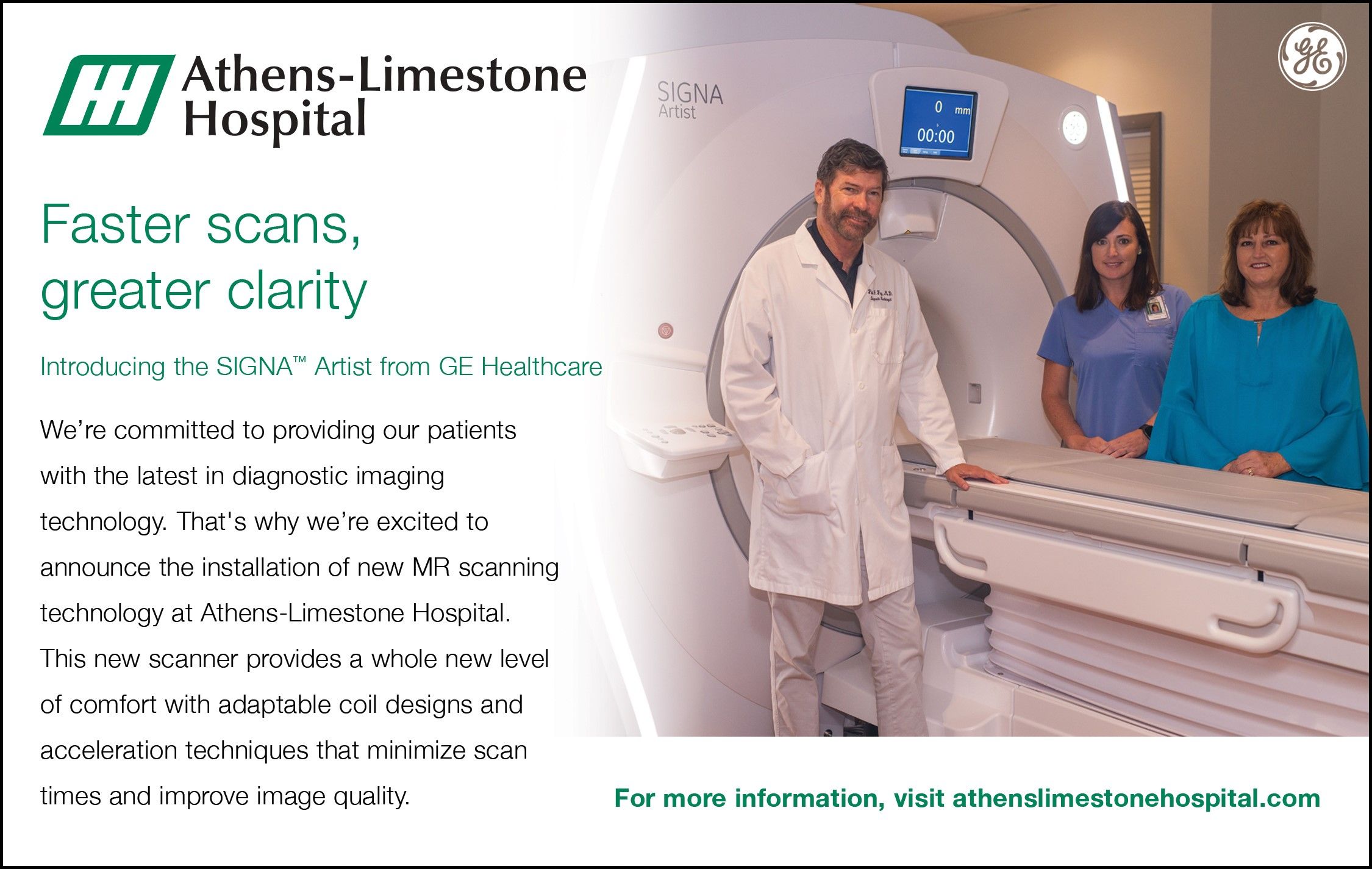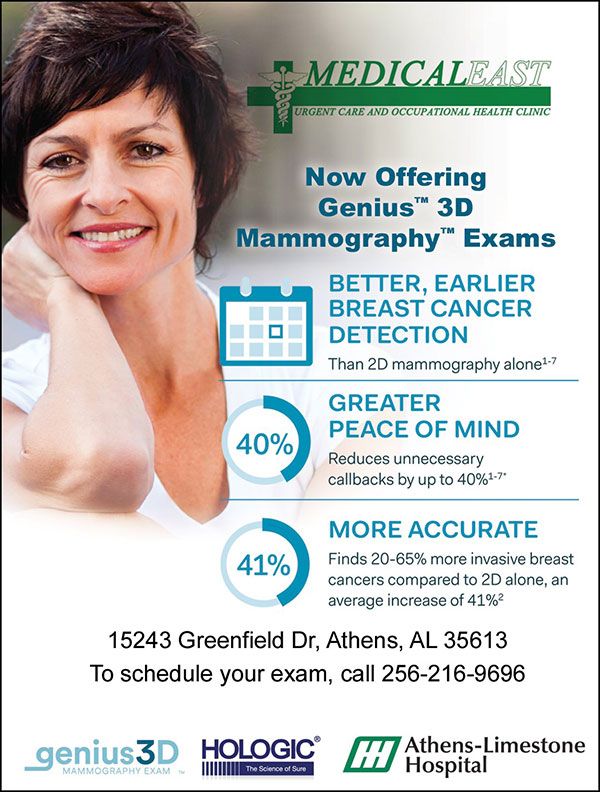Athens-Limestone Hospital (ALH) is proud to announce the new magnetic resonance imaging machine (MRI) in the ALH Radiology Department. This state-of-the-art scanning technology is the newest and most advanced MRI in our area and can be found right here at your local hospital. This is just another example of ALH’s commitment to providing patients with the latest in diagnostic imaging technology.
Dr. Paul Fry, ALH Chief Radiologist, has been with ALH since 1994. He is part of the Huntsville Hospital radiology team.
Patients who need an MRI for any number of reasons from neurological issues, muscular and skeletal problems,or even pregnancy conditions, will benefit from this new technology. The wide bore system and flat AIR® Coil gradient cold designs allows for greater comfort and faster, higher quality scans.

What is Magnetic Resonance Imaging?
MRI uses magnetic fields and radio waves to produce a highly accurate anatomic image. It is painless and extremely safe because no radiation is used. The level of detail that can be seen is extraordinary compared with other imaging methods. It is the method of choice for the diagnosis of many types of injuries and conditions such as:
- Cranial imaging
- Breath-hold abdominal imaging
- Scans of the liver, pancreas, adrenals and kidneys
- Orthopedic and sports-related injuries
- Circulatory imaging (angiography of major vessels such as the aorta and carotid)
- Stroke assessment for earlier detection and treatment and post-stroke tracking
- A Better Choice for You
Stroke Patients
MRI can identify patients that have suffered a stroke, the extent of damage, and it allows your physician to track the progress of post-stroke therapy.
Vascular Patients
Major circulatory vessels such as the aorta and carotid can be examined without the lengthy invasive procedures previously required.
Orthopedic Patients
Being a weekend warrior or a high school athlete can lead to sports-related injuries. Athens-Limestone Hospital's MRI can help your physician better diagnose and treat these types of injuries so you can get back in the game sooner and healthier. Athens-Limestone Hospital's specialized orthopedic coil technology provides the highest resolution imaging which will significantly improve the diagnosis and treatment of fractures, sports injuries and tumors of the bone.
Stroke Assessment
Athens-Limestone Hospital's MRI offers diffusion weighted imaging which is not clinically useful on lower field Open systems. Diffusion weighted imaging is able to quickly identify patients that have suffered a stroke and identify the extent of damage. Diffusion weighted imaging allows the physician to track post-stroke therapy. For stroke patients, this type of imaging can quickly assess a stroke and identify the extent of the damage. It also allows the physician to track post-stroke therapy so they can better evaluate the patient's progress.
Non-Invasive Vascular Analysis
MRI is very useful in diagnosing and treating patients with vascular disease (diseases of the circulatory system) which previously required invasive procedures. The patient's vascular disease can be diagnosed avoiding a lengthy and invasive diagnostic angiogram. Lower field open systems do not provide the clarity and confidence to diagnose vascular disease.
Highest Resolution Orthopedic Imaging
Athens-Limestone Hospital's specialized orthopedic coil technology provides the highest resolution imaging which will significantly improve the diagnosis and treatment of fractures, sports injuries and tumors of the bone.
Athens-Limestone Hospital CT Systems
Athens-Limestone Hospital has added an additional CT scanner, located conveniently across the street from the hospital, to help expedite care for outpatients. ALH Diagnostic Center, 101 Fitness Way, Suite 2400, Athens, AL 35661, is available Monday-Friday 7:30AM – 5:30PM. We offer CT scans of the abdomen, head, spine, extremities, neck, vascular system and organs. CT can help diagnose cysts, blood clots, hemorrhages, infections, cancer and other diseases. The outpatient facility is a fast and easy location to get your outpatient testing completed without having the extended wait times that sometimes occur in the hospital due to emergency patients.
Athens-Limestone Hospital still offers quality CT scans within the hospital as well. The hospital has two CT scanners and is capable of cardiac studies and other functional special procedures. These images are acquired through cross-sectional pictures that represent slices of the patient's body. Seconds later, the system's computer assembles the slices into three-dimensional images that are interpreted by a radiologist or cardiologist.
Please call our central scheduling office at (256)216-9696 to schedule your appointment.
Mammography Services
ALH Offers Mammography in 2 Convenient Locations
- Athens-Limestone Hospital
700 West Market Street
Athens, AL 35611
- Athens-Limestone Diagnostic Center
15243 Greenfield Drive
Athens, AL 35613
Corner of Lindsay Lane & Hwy. 72
In the Athens-Limestone Medical Village
Call (256)216-9696 for an appointment at either of these locations.

Mammography is performed to screen healthy women for signs of breast cancer. It is also used to follow-up on findings from screening or to evaluate a woman who has symptoms of breast disease. Mammograms are the best way to find breast cancer early. A mammogram is the best test for breast cancer.
Mammography can detect cancers before you can feel them with your fingers
Annual screening mammograms, beginning at age 40, reduce death from breast cancer
While mammograms successfully find most breast cancers, like all medical tests, mammography is not perfect. A mammogram may show abnormalities that are not breast cancer, or not show an abnormality that is breast cancer. Sometimes the doctor will use ultrasound or MRI to further examine an abnormality and evaluate the next best step. Sometimes a woman may find an abnormality not found on her mammogram. If you find anything unusual, call your doctor right away. Don't wait. Make sure to tell your doctor if there is a family history of breast cancer. However, every woman is at risk for breast cancer. When detected early, breast cancer can be treated successfully.
From Age 20 On
Have a clinical breast exam by a doctor or nurse at least every 3 years. Learn how to examine your breasts and call your doctor if you find anything unusual.
At Age 40
Have a clinical breast exam and mammogram every year. Examine your breasts and call your doctor if you find anything unusual.
Remember - Bring your previous mammograms with you if you are changing to one of our mammogram facilities.
In cases where a biopsy is recommended, Athens-Limestone Hospital has several options to offer you. Athens-Limestone is proud to offer stereotactic biopsy, mammotome and core needle biopsies. Stereotactic is a less invasive procedure to sample calcifications that may be seen on a mammogram. This procedure does not require sedation. The patient lies on the exam table on their stomach and the breast is placed in an x-ray machine that locates the calcification and the radiologist administers lidocaine and inserts a needle in the exact spot the calcification is located. Then another x-ray is made of the area to be sure the calcification is removed. Mammotome is a procedure used under ultrasound where abnormal looking tissue is removed with a small tube under local anesthesia. This is a simple and fast method to remove tissue to be sampled with a vacuum. Core needle biopsies are also minimally invasive procedures under ultrasound where a small sampling of abnormal tissue is removed with a needle. These calcification samples and abnormal tissues are then sent to the lab to determine if they are benign(not cancerous) or malignant.

